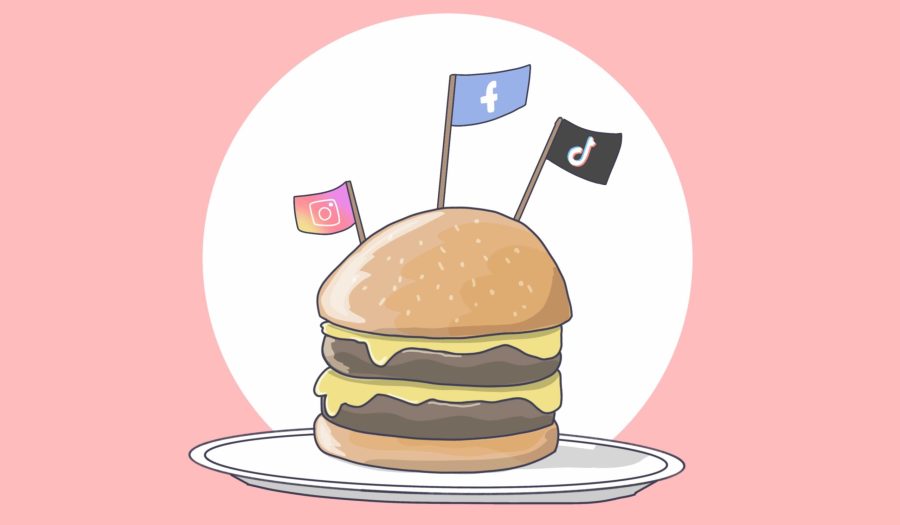As summer approaches, obtaining the ideal summer body is at the top of many to-do lists. In an attempt to reach the ultimate “hot girl summer” physique, those looking for ways to lose weight will turn to various types of diets and workout routines. However, in the pursuit of a slimmer body, many remain blind to the realistic consequences of these so-called “diets,” most of which are eating disorders in disguise. While it is important for us to address unhealthy habits, such as eating a tub of ice cream at 4 a.m., switching to unnecessary and intense diets in a determined effort to lose weight is not a healthy solution.
Whether it’s on YouTube or TikTok, we are constantly introduced to new popular diets that will help you “lose your belly fat” or “cut 20 pounds in two weeks.” In reality, these “diets” are either quick-fixes that will work for a month or are ineffective altogether, most of which cause more harm than good. Because of the rise of influencers advertising special weight-loss teas and internet creators on strict diets making day-in-the-life videos, impressionable, insecure, and susceptible audiences are getting roped into thinking about their bodies in a negative way, causing them to turn to unhealthy measures in order to meet these newfound standards. This is an effect of what is known as “toxic diet culture.”
The Alliance for Eating Disorders defines toxic diet culture as, “Any programs that encourage extreme weight loss, require restricting yourself, and suggest cutting calories […] as well as programs that advertise weight loss pills and shakes.”
Especially on social media, we are led to believe that weight equates to health when in reality, it is not as cut and dried. Research has shown that there are metabolically healthy thinner people and metabolically healthy larger people. Our behaviors and routines influence the status of our health, not weight itself, and putting the emphasis on weight loss and body size makes people more susceptible to turning to unhealthy eating habits in a desperate attempt to fit the mold.
This leads to the bigger question: what is our true motivation to go on a diet?
Diet culture often utilizes and exacerbates fatphobia. We shouldn’t be scared to “look fat” and for it to be our main motivator to lose weight. We should be striving to live the healthiest lives possible, which doesn’t always mean being supermodel skinny or having a six-pack. And for those that cannot lose weight through special and intense diets, the obsession with diet culture leads to various eating disorders and mental health issues.
Within diet culture, there is the idea that there are superior ways of eating, such as “clean,” Paleo, low-carb, intermittent fasting, and keto. This encourages us to be insanely cautious about everything we eat instead of eating for the enjoyment and satisfaction of eating. Restriction of certain foods only leads to shame and guilt whenever we “fall off the wagon” or have a “cheat day.”
The glorification of toxic diet culture on social media has not gone unnoticed. In September 2019, Instagram announced that they will be hiding posts that promote weight loss from users under the age of 18. Due to social media being such an influential platform for advertising and influencing, the rise of posts regarding diets and weight loss can be detrimental not only to young impressionable audiences but also to anyone with insecurities about their body.
According to a clinical report by the American Academy of Pediatrics, those who dieted moderately were five times more likely to develop an eating disorder, while those who restricted food intake extremely were 18 times more likely.
The more extreme or restrictive a diet is, the more likely it is to lead to orthorexia — a term that refers to an individual having an unhealthy obsession with healthy food. Much in the same way a person who struggles with anorexia or bulimia obsesses over calorie count and weight, someone with orthorexia fixates on clean eating.
One-track diets such as keto imply that cutting out an entire food group is somehow healthier than our previous lifestyle. We are taught that everything is good in moderation; this philosophy should not only apply when we have excess intake but when nutrient deficiencies are occurring as well.
Many go “Keto” in hopes of losing weight and managing their blood pressure; however, because the keto diet is so restrictive, health experts say it’s not an appropriate plan to follow long-term. It can actually cause constant weight fluctuations, less muscle mass, decreased metabolism, and even an increased risk of heart disease and diabetes.
Most people hear about these diets from social media, and just like any other trend, people try them. However, because they are convinced that their unhealthy habits can only be combatted through these glorified health risks, many people fall victim to toxic diet culture.
Even purchasing the detox tea from that YouTube ad is essentially just purchasing laxatives and offers no nutritional or beneficial gain. Detox teas commonly cause abdominal pain and discomfort, leading to cramps, bloating, gas, and nausea. The high levels of caffeine and laxative ingredients put stress on the digestive system and are ineffective for maintaining any type of weight loss.
Most diets are nearly impossible to keep up with, which makes falling off of them even worse on people’s mental health and their outlook on food. Associating carbs with gaining weight and losing weight with self-satisfaction only creates an environment of insecurity and fear.
We are scared of food. We are scared of eating the wrong thing and fearful of how society will see us because of it.
Realistically, no one on social media is equipped to tell you what is healthy for your body and what works for losing weight in a healthy way. Instead of jumping from one unhealthy eating habit to another, we need to find a healthy way to address the parts of our diets we need to fix. If you are serious about kicking your bad eating habits or finding truly healthy alternatives to foods, a simple and smart solution is to go to nutritionists — who are qualified to give advice and can help you come up with a plan specialized for yourself.
As a species that has spent centuries testing and creating a plethora of foods, we should not fear it. While it can be easy to fall into the habit of snacking and overeating, we must also remind ourselves that less is not inherently better.
From “what I eat in a day” TikToks to different teas and juices that show up on our Instagram feed, diet culture is all around us. Instead of letting it control how we view food, ourselves, and others, we must understand the complexities of the human body and appreciate food for giving us the strength and nutrients we need to survive. The bottom line is that we shouldn’t fear food, nor should we have to.
Art by Andrew Diep for the UC San Diego Guardian.
















